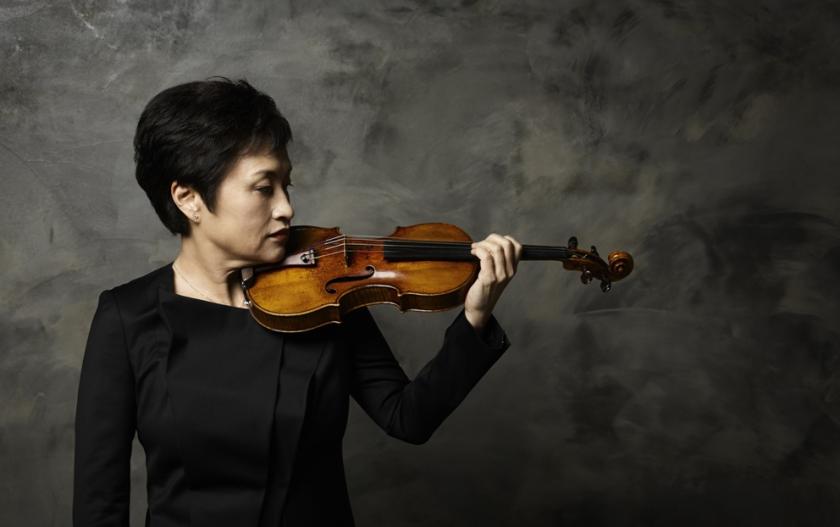In one way, it makes sense to give your London comeback concert in the venue where you made your European debut 44 years ago. Yet the Royal Festival Hall is a mighty big place for a violin-and-piano recital. Kyung Wha Chung had no problem nearly filling it last night with an audience including whole Korean families, but might have wished she hadn’t in the ailment-ridden dead of winter; her look could have killed a coughing child ("go and get a glass of water" is what I think I heard her say, from my very distant seat). There were swathes of panache in an emotionally demanding programme, but too much palpable unhappiness until at last she hit her stride with a pianist whose demeanour but never his playing suggested the deference of an accompanist, the superlative Kevin Kenner.
He took the lead, as Mozart’s G major Sonata K379 and Schubert’s D major demanded, at either end of the concert. Every piano trill and ornament were stylistically perfect. Chung’s intonation and phrasing wavered in the Mozart, but by the first and second encores – two movements of the Schubert sonata – she had relaxed into easy musicality with her pianist, whose hand she finally took, persuading him to step forward into her orbit, for the official curtain-calls. Prokofiev’s First Sonata, the most austere masterpiece of those Soviet years which brought depth and sadness to the composer's melodic gifts and brilliant characterisations, was an unshowy choice often forcibly expressed. Still, I wish Chung’s tendency to push and over-romanticise phrases hadn’t extended to the extraordinary rushing passages marked freddo ("cold") Prokofiev described as "like the wind in a graveyard"; they have to be even and inhuman, or at least supernatural – listen to Alina Ibragimova’s stupendous recent recording with Steven Osborne – and here they were neither.
 Even the overall monumentality of the first-movement elegy was too toyed with, though Chung and Kenner (pictured right by Christian Steiner) found the right introspection in the Ravelian water-music of the spellbinding Andante (by one of those unhappy coincidences in London's densely-packed concert life, over at the Wigmore Hall the fabulous Yevgeny Sudbin was takling another Prokofiev stunner, the Seventh Piano Sonata, at almost the same time). Bach’s great Chaconne from the Second Partita after the interval brought greater confidence, but again an inappropriate romanticism lacked the marble pedestal on which another monument, however keen and human, ought to be placed; the moments impressed more than the overall sweep and structure.
Even the overall monumentality of the first-movement elegy was too toyed with, though Chung and Kenner (pictured right by Christian Steiner) found the right introspection in the Ravelian water-music of the spellbinding Andante (by one of those unhappy coincidences in London's densely-packed concert life, over at the Wigmore Hall the fabulous Yevgeny Sudbin was takling another Prokofiev stunner, the Seventh Piano Sonata, at almost the same time). Bach’s great Chaconne from the Second Partita after the interval brought greater confidence, but again an inappropriate romanticism lacked the marble pedestal on which another monument, however keen and human, ought to be placed; the moments impressed more than the overall sweep and structure.
Chung lacked the security and relaxation to find the supreme ease that ought to launch Franck’s mighty Violin Sonata. Here, though, the familiar sweetness and power of the upper register, absent in the first half, properly emerged, and again there were moments of sweep in the colossal second movement, where Kenner showed he is just as much at home in spacious rodomontade (after all, he was a prizewinner in the Tchaikovsky International Competition). That my concentration came and went in the trickily diffuse slow movement suggests that Chung’s did too, though at last she and Kenner hit the easy, intimate stride that would hold good for the Schubert encores and Elgar’s Salut d’amour in the heartease of Franck’s finale. That half the hall rose to its feet suggested to me more respect for the legend than the fair response to a very mixed return visit. The Wigmore or Kings Place might be a better choice next time if Chung wants to truly relax into her undoubted musicianship.














Add comment